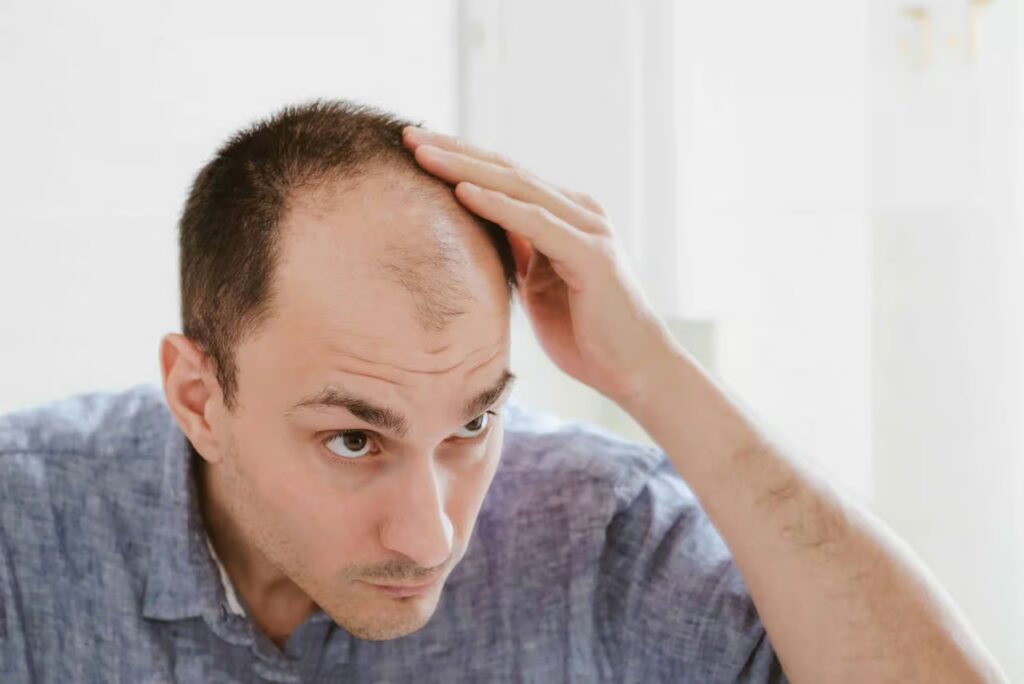Hair Loss treatment
6am - midnight, 7 days a week
Accessible from anywhere in Australia.
eScript in minutes
Medication delivery
What is hair loss?
Hair loss, also known as alopecia, is a condition that leads to thinning or loss of hair from the scalp or other parts of the body. It can be temporary or permanent and may result from genetic factors, medical conditions, hormonal changes, or lifestyle factors. Hair loss can affect both men and women and varies in severity.
Hair Loss Treatment Options

Online Prescriptions
- For when your script has run out
- Script sent to your phone
- Doctor approved

Telehealth Consultations
- When you need to speak to a doctor
- Online, Video & Phone Call or Message
- Fast access to medical advice
Medical Certificates
- For when your script has run out
- Script sent to your phone
- Doctor approved

Hair Loss Symptoms
Symptoms of hair loss depend on the underlying cause and may include:
- Gradual thinning on the scalp, especially at the crown or hairline
- Patchy or circular bald spots
- Sudden hair shedding, particularly after physical or emotional stress
- Full body hair loss due to medical conditions or treatments like chemotherapy
- Scalp irritation or itching in some cases
Understanding Hair Loss
Explore the causes, patterns, and complications related to hair loss.
Hair loss can be caused by genetics (androgenetic alopecia), hormonal changes, stress, poor nutrition, medical conditions like thyroid disease or autoimmune disorders, and certain medications. Hairstyles that pull on the hair can also contribute.
Common patterns include gradual thinning on the scalp, patchy bald spots, sudden hair shedding, or full-body hair loss. The pattern and progression depend on the cause and individual factors like age and health.
Although hair loss is often not physically harmful, it can impact self-esteem, body image, and emotional wellbeing. In some cases, underlying conditions causing hair loss may go undiagnosed without medical evaluation.

Need a Specialist Referral?Get Yours in a Few Simple Steps!
Skip the long clinic waits and get referred to a specialist in minutes. The process is fast, secure, and simple.
- Quick access to specialist referrals – no in-person appointments needed
- Telehealth consultations with trusted, licensed doctors
- Fast, reliable service – referrals sent directly to your chosen specialist
- Convenient and affordable healthcare from your home
- No hidden costs – just simple, upfront pricing
Frequently
Asked Questions
Diagnosing hair loss typically involves a physical examination and a review of medical history. A doctor may examine the scalp to check for signs of infection, scarring, or other conditions. In some cases, blood tests may be conducted to identify underlying health issues, such as thyroid dysfunction or anemia, that could contribute to hair loss. A scalp biopsy or a hair pull test may also be performed to determine the cause of the hair loss.
While some forms of hair loss, such as genetic pattern baldness, cannot be prevented, others can be mitigated with early intervention. Maintaining a healthy lifestyle, eating a balanced diet, and avoiding excessive stress can help prevent hair thinning. For those at risk of hair loss due to hormonal changes, medications or treatments can be prescribed to slow or stop the progression.
In some cases, hair loss can be reversed, especially if the underlying cause is treatable. For example, if hair loss is caused by nutritional deficiencies or a thyroid imbalance, addressing the issue may lead to hair regrowth. Treatments like minoxidil and finasteride can help promote hair growth in cases of androgenetic alopecia. However, in more advanced stages of hair loss, such as in male pattern baldness, it may be difficult to fully reverse the condition, but treatments can slow progression and improve appearance.
There are several treatment options for hair loss, depending on its cause. Over-the-counter treatments like minoxidil (Rogaine) are commonly used to stimulate hair growth and slow hair loss. For men, finasteride (Propecia) can be prescribed to block the hormone responsible for hair loss. In more severe cases, hair transplant surgery may be an option, where hair follicles are moved from one area of the scalp to another. Low-level laser therapy and platelet-rich plasma (PRP) injections are also being explored as options for encouraging hair regrowth.
Hair loss can sometimes indicate an underlying health issue, such as a thyroid disorder, autoimmune condition, or anemia. It can also be linked to stress or poor nutrition. However, in many cases, especially with male and female pattern baldness, hair loss is not a sign of a serious health condition. If hair loss is sudden, patches of baldness appear, or it’s associated with other symptoms like fatigue or weight changes, it’s important to see a doctor for a thorough evaluation.
Yes, stress can contribute to hair loss. Stress can trigger a type of hair loss known as telogen effluvium, where more hairs than usual enter the resting phase of the hair growth cycle, leading to shedding. Stress-induced hair loss is typically temporary, and hair often regrows once the stressor is removed. However, chronic stress can contribute to ongoing hair thinning, so managing stress through relaxation techniques and self-care is important for overall hair health.
A healthy lifestyle can help support hair health and potentially prevent excessive hair loss. Eating a balanced diet rich in vitamins and minerals, including iron, zinc, and vitamins A, C, and E, can promote strong hair. Avoiding harsh chemical treatments or excessive heat styling can reduce damage. Regular scalp massages to stimulate blood flow, exercising to improve circulation, and managing stress can also support healthy hair growth.

